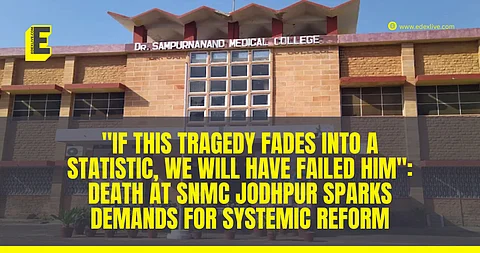

The corridors of Dr SN Medical College in Jodhpur fell silent on the morning of June 18, as resident doctors staged a symbolic two-hour strike in protest against what they describe as institutional apathy following the tragic death of their colleague, Dr Rakesh Vishnoi.
The third-year pharmacology resident died by suicide on June 13 after allegedly consuming poison, becoming the latest casualty in a disturbing pattern of student deaths at the prestigious institution.
Dr Vishnoi's death has sent shockwaves through the medical community, not merely because of its tragic nature, but due to the circumstances surrounding it. In a video recorded before his death, he reportedly named his guide, Dr Rajkumar Rathore, as responsible for the harassment that drove him to take his own life. His family has refused to cremate his body, staging a dharna outside the hospital's mortuary while demanding justice and a formal investigation.
“Dr Vishnoi did not approach the RDA or, to our knowledge, any formal institutional body regarding harassment or mental health concerns,” explains Dr Ranjeet Choudhary, General Secretary of the Resident Doctors' Association (RDA) at SNMC. “His video, released just before the incident, was the first time we became aware of the extent of the pressure he was facing. In hindsight, it's a tragic reminder of how many residents suffer in silence.”
The incident has exposed what many consider a systemic crisis within India's medical education system. SNMC and it's affiliated All India Institute of Medical Sciences (AIIMS) Jodhpur have witnessed at least five student suicides in recent years, including two final-year MBBS students in early 2021, both citing mental stress in their suicide notes. The pattern suggests institutional failures to implement effective mental health safeguards.
“Unfortunately, within just the past two months, we've lost two young doctors,” Dr Choudhary reveals. “The first was Kavitha Verma, an intern who had been battling chronic depression. The second was Dr Vishnoi, whose death is being linked to severe depression, possibly exacerbated by thesis-related harassment. These back-to-back tragedies highlight serious systemic gaps, especially in mental health support and grievance redressal.”
The investigation into Dr Vishnoi's death has taken on political dimensions, with State Minister KK Vishnoi confirming that Chief Minister Bhajanlal Sharma is treating the matter with “utmost sensitivity” and promising “strictest legal action against the guilty.” The minister's statement acknowledges “serious allegations of mental harassment, insulting behavior, and constant pressure against the departmental head.”
However, the RDA's investigation presents a more complex picture.
When asked about other students’ experiences with the accused guide, Dr Choudhary notes, “Based on their accounts, there have been no prior complaints or incidents suggesting harassment or mistreatment. In fact, these students have conveyed that the guide has maintained a professional relationship with them. They also mentioned that Dr Vishnoi had been dealing with personal mental health challenges."
This nuanced perspective underscores the difficulty of addressing mental health crises in high-pressure academic environments, where the lack of adequate support systems becomes all the more stark and consequential.
“Currently, the only mechanism in place is a grievance committee, but its scope is limited, and it's not equipped to handle mental health crises or provide psychological support,” Dr Choudhary explains. “There are no trained counsellors, no peer support structures, and no proactive mental health awareness initiatives.”
The RDA has presented five specific demands to the administration, including the immediate suspension of those responsible, the formation of a high-level inquiry committee, and the implementation of comprehensive mental health support for resident doctors and their families. They have also called for clear protocols for residents facing stress and concrete reforms to prevent future incidents.
The tragedy has resonated beyond Jodhpur, with resident doctors in Jaipur also threatening to go on strike if no action is taken. The broader medical community is watching closely, hoping that this incident might catalyse meaningful change rather than becoming another forgotten statistic in India's medical education crisis.
“We sincerely hope it becomes a turning point,” said Dr Choudhary. “Dr Vishnoi’s death has shaken the entire medical community. If this tragedy is allowed to fade into a statistic, we will have failed him, and every other young doctor struggling in silence.”
The RDA's next steps remain contingent on the administration's response, with a total work boycott remaining “one of the options on the table” following a General body meeting. The decision will be made democratically, with Dr Choudhary emphasising that “patient care considerations” will factor into any escalation of protests.
For now, Dr Vishnoi's colleagues are determined to ensure that his death serves as a catalyst for change rather than a cautionary tale of institutional indifference.
“This moment demands more than condolences,” Dr Choudhary concludes. “It demands change.”
